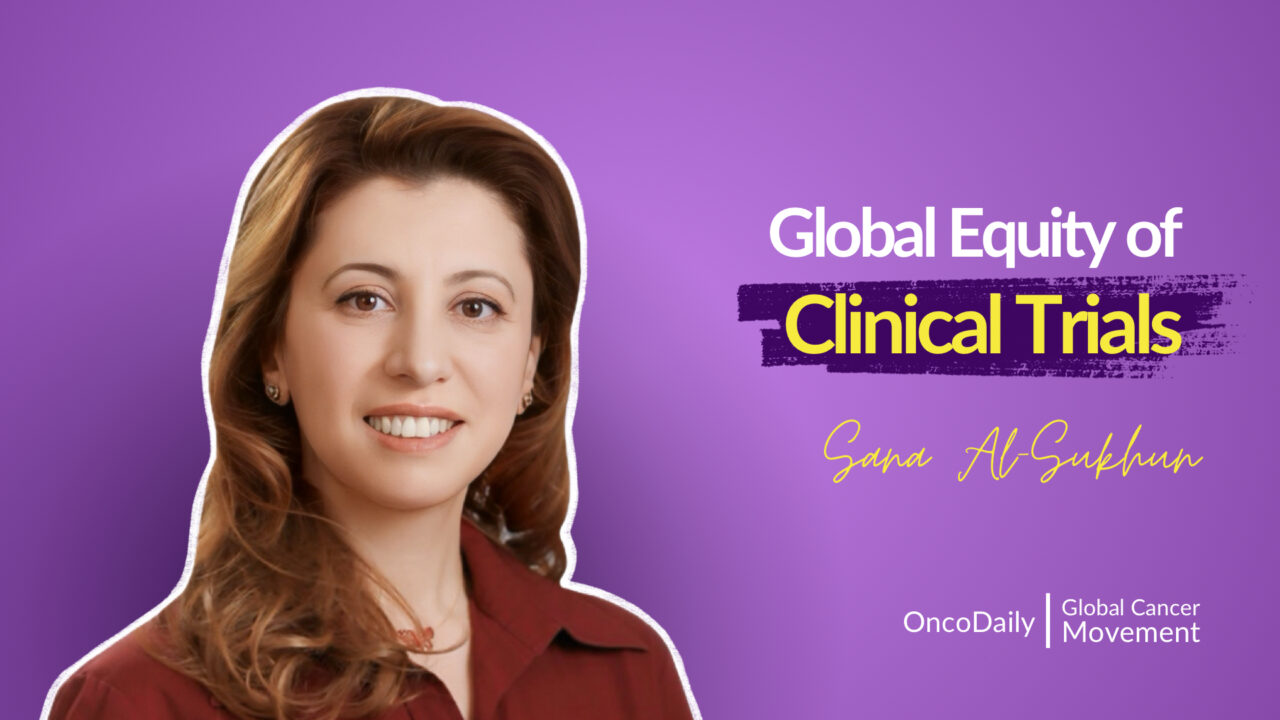
Global Equity of Clinical Trials – Global Cancer Movement
In the inaugural event of the Global Cancer Movement, initiated by OncoDaily, Dr. Sana Al-Sukhun explores the critical challenges and opportunities in advancing global equity in clinical trials. The virtual event, held from December 6-8, 2024, underscores the disparities in research access, particularly in low- and middle-income countries, and highlights innovative strategies for fostering inclusivity in cancer research.
Sana Al-Sukhun addresses global equity in clinical trials, highlighting its significance, challenges, and opportunities. The discussion begins with defining global equity in clinical research, emphasizing the need to ensure fair, though not necessarily equal, access to clinical trials for diverse populations and regions, especially those underrepresented, such as low- and middle-income countries (LMICs), certain ethnicities, and socioeconomic groups. This equity is crucial for ensuring scientifically applicable and generalizable data, upholding ethical fairness, and addressing unmet patient needs.
The speaker underscores the disparity in clinical trial distribution, noting that while two-thirds of cancer cases occur in LMICs, 80% of trials are conducted in high-income countries. This inequity persists despite slight increases in trial activity in some middle-income regions. However, low-income countries see negligible participation, and projections indicate this gap will continue.
The barriers to achieving equity are extensive. Governmental apathy or restrictive regulations in LMICs impede trial conduct, compounded by lack of funding and infrastructure. International funding often comes with conditions favoring high-income institutions, sidelining LMIC researchers. Ethical dilemmas arise when clinical trials compare innovative drugs with suboptimal control treatments, given the lack of access to standard therapies in LMICs. This challenges adherence to the Helsinki Declaration, which demands ethical parity in trial design.
Patient participation faces hurdles, including logistical challenges, financial burdens, and cultural distrust in clinical trials, exacerbated by limited public awareness. Advocacy groups and culturally appropriate consent processes are suggested to mitigate these issues.
The industry also hesitates to invest in LMICs due to inadequate infrastructure, lack of trained researchers, and insufficient supportive resources like accredited labs and medications. The speaker identifies a vicious cycle of demotivation, insufficient training, and lack of recognition for LMIC researchers, further discouraging participation.
Despite these challenges, the speaker outlines potential solutions, including forming a global network of research centers with standardized agreements, adaptive trial designs, and policies to motivate and fairly compensate LMIC researchers. Efforts to counter “trial parachutism”—where high-income researchers dominate trials in LMICs—are advocated. The industry is encouraged to view infrastructural gaps as opportunities to strengthen clinical and research systems in LMICs.
Collaboration between high- and low-income country researchers is emphasized as a key to progress. Practical and ethically balanced trials, focusing on de-escalation and resource-appropriate designs, are suggested as interim measures until systemic changes are implemented. Finally, Sana Al-Sukhun highlights the need to empower patient advocacy groups to raise awareness and bridge the gap between communities and clinical research.
-
ESMO 2024 Congress
September 13-17, 2024
-
ASCO Annual Meeting
May 30 - June 4, 2024
-
Yvonne Award 2024
May 31, 2024
-
OncoThon 2024, Online
Feb. 15, 2024
-
Global Summit on War & Cancer 2023, Online
Dec. 14-16, 2023
